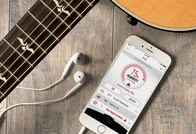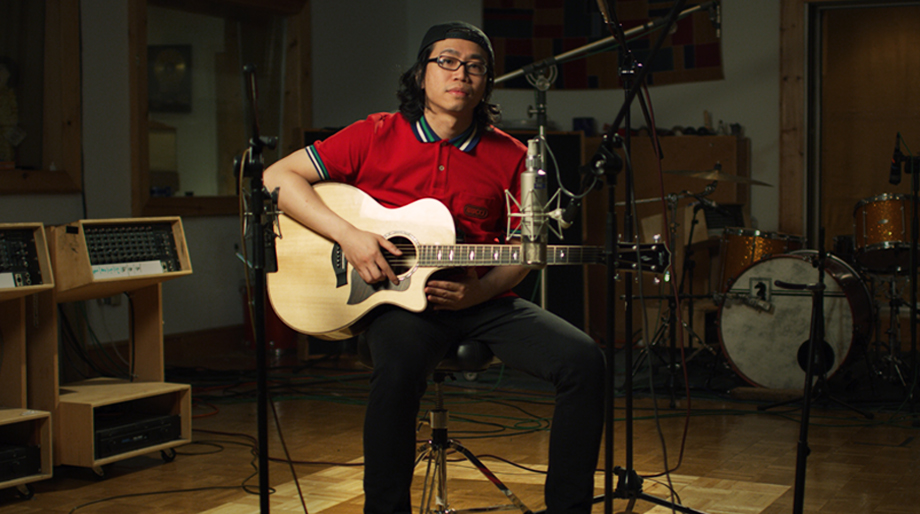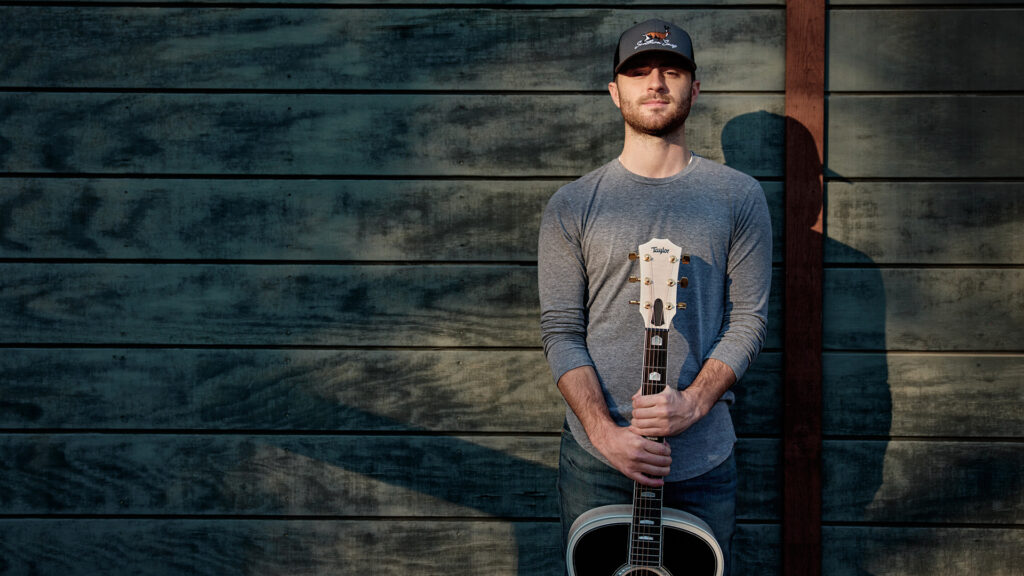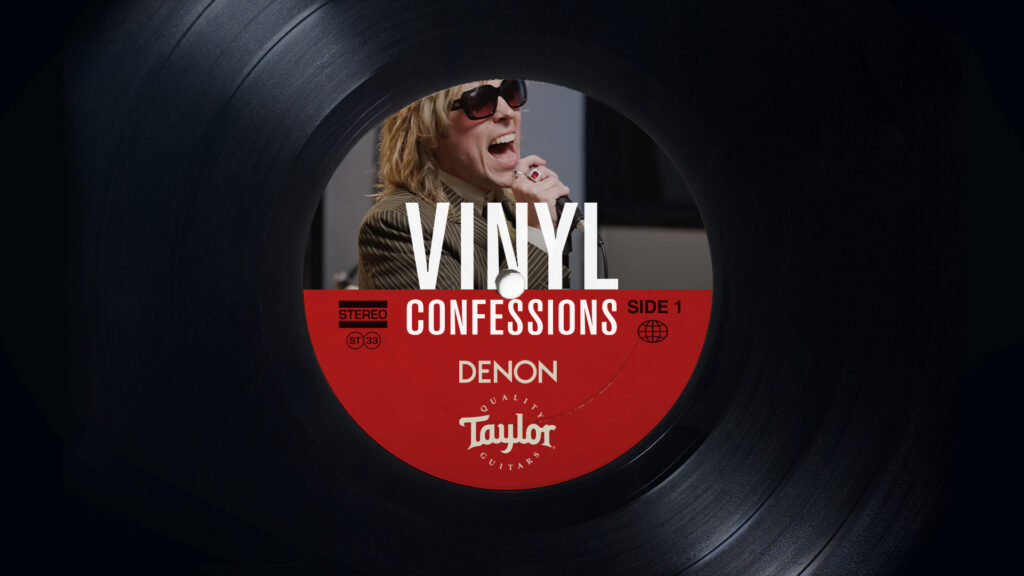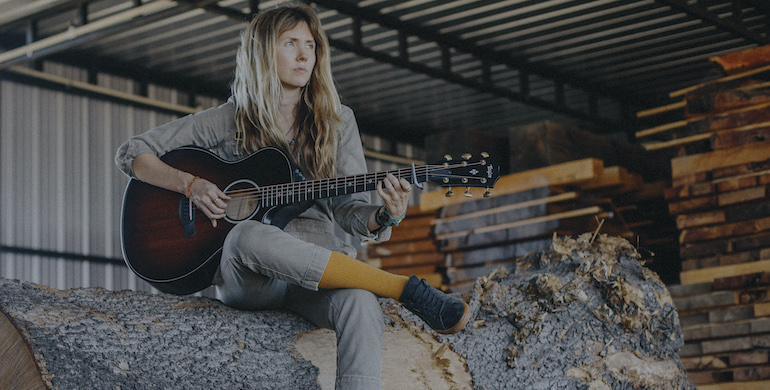To say Will Yip is in demand is an understatement. If you listen to punk, hardcore, metal, or emo, you’ve probably heard his work. The producer, engineer, songwriter, and musician has masterminded countless albums in the catalog of heavy music, from Circa Survive to Superheaven and Turnover to Code Orange. Correspondingly, Yip’s sessions at Studio 4 in Conshohocken, Pennsylvania are booked months, if not years, in advance, and he doesn’t seem to grasp the concept of a vacation—or at least that’s the feeling you get from talking to him about his work.
In addition to his production work, Yip is also the curator of his own record imprint, Black Cement. Launched through Atlantic Records in 2017, Yip’s label recently released its first album, Tigers Jaws’ Spin, which he also produced. Although Yip will always be associated with heavier records (Code Orange’s Forever was recently nominated for a Grammy for Best Rock Performance), he uses Taylor acoustics in the studio far more often than you might think, especially for records that inspire impassioned headbanging.
We spoke to Yip about how he utilizes Taylor acoustic guitars on distortion-drenched albums, how the instruments inspire his artists, and why he’s excited to go to work every single day, regardless of how much he slept the night before.
How important is it to have a great acoustic guitar when it comes to recording in the studio?
Having a great acoustic is seriously my secret, not-so-secret weapon. A great acoustic shows up on about 95% of my records; an album like Superheaven’s Jar is all guitars, so the crispness and attack of an acoustic are so important. I love overdubbing, and I love layering heavy parts, especially if we’re doing power chords or barre chords. I especially love overdubbing with acoustics because it adds this amazing percussive quality to the sound. That said, if you take a cheap guitar and try to use it for that purpose, you’re not going to get that affect. You don’t really hear the tone of the guitar, just the attack. To get the percussiveness you want with a great sound, you really need a high-quality instrument.
Even on heavy records, I use my Taylors just to add an element of extra heaviness, and the perceived striking of guitar strings. People assume that’s all coming from distortion, but I actually lean a lot on acoustics. That’s a little secret of mine that I love sharing because I want people to know about those dynamics on these records, and that’s totally by design. Alternatively, I do a lot of writing and composing on acoustics. In fact, 95 percent of the time I’m doing those things on an acoustic guitar because I feel like it’s more inspiring. It’s also a lot easier than setting up an amp and pedals. I always try to push bands to find the inspiration to write in the studio, because we’re always trying to come up with new ideas—so having an inspiring instrument is really important.
When I have my Taylors sitting out, I can’t tell you how many times people have picked one up, started messing around, and then said, “Dude, I have an idea.” It all starts from a guitar. They’re all great writers, but having a high-quality instrument around really inspires people. I’ve played drums and acoustic guitar in a lot of places where the room or the instrument sucked, and I didn’t want to play it, you know what I mean? We didn’t write anything. But you can ask any band, and they’ll tell you there’s something that happens when you get in here with a Taylor 814ce. It inspires writing that you aren’t going to get in a basement with a low-quality guitar.
I think having a quality instrument like that around is so important for many reasons, but in terms of being a producer, I just love having tools. I treat guitars the way that hip-hop producers treat synthesizers. For example, yesterday we were working on an idea with mewithoutYou: They had this arpeggiated lick they laid down on electric, and it sounded great, but something was missing in the sense that it wasn’t cutting through the mix. To fix it, we overdubbed the high-octave arpeggiation with an acoustic. I just love having tools around and not relying on what the amp or pedals can do. Just like a producer with a thousand different drum pads and beats, I have four beautiful Taylors here that I can plug in and play whenever I need them.
What records have you worked on recently that you think showcase the Taylors’ versatility in the studio?
I can think of two albums off the top of my head. One is the new Anthony Green solo LP that’s still untitled. It’s the Anthony Green record that all his fans want in the sense that he’s giving them a stripped-down record. There’s something about solo shows and him and acoustic guitar that moves people. People already have him [playing with full bands in] Circa Survive and Saosin, so I think they want a record with him playing on an acoustic. This record is centered around Anthony singing a single vocal track and playing a single guitar track, and every single guitar on it is a Taylor. If you’re a doing a record in that way, you want to have the best acoustic possible; it’s your only instrument, so you’re relying on it as your bass, drums, time-keeping, everything. We actually used his short scale 322ce 12-fret guitar on it. It’s a way smaller guitar, but he’s just so comfortable with it and it’s so effortless for him to play that it just shined, even though it wasn’t a super high-end model. It still sounded so expensive and so great because he was so inspired by it, and that’s the important thing—that guitar is like an extra limb for him.
I also worked on the new Say Anything record, which in my opinion is the best record of theirs to date. Unlike Anthony’s album, it’s not just an acoustic record. It’s based around acoustic guitars, but it’s still basically Max Bemis with his full band. Still, we used acoustic and electric guitar all over it. We used an 814ce DLX and bounced it with a 616ce on the left and right channels, so we had two acoustics on almost every song.
I’m not missing electric instrumentation right now, and that’s saying a lot for me. I’m used to having my ears bashed by those guitars all day. Those are two records that really showcase Taylors, and they both sound great. They’re made with completely different guitars, but they all inspired very cool and unique performances.
Additionally, I was lucky enough to create some records with Turnover. I don’t think many people know this, but 95 percent of the guitar tracks are supplemented by acoustics on those records. That’s a huge part of the vibe on those albums. When you hearing the plucking, that’s not just the Jazzmaster and Jazz Chorus. Most of the guitars are paired with an acoustic, and I think that really added a cherry on top of [2017’s Good Nature] as far as the guitar sound goes. I don’t think anyone has ever pointed that out to me, because the acoustics can be overshadowed by the distortion pedals and pads and stuff. But the reason why those pads sound good, and why the guitar tone isn’t getting drowned out, is because of the acoustics. The Taylor cuts through the mix and supplements the electrics. That’s a cool secret weapon and a really interesting tool for a producer. All acoustics have their own niche—I know a lot of producers call Taylors “clean-up” guitars or “bone-dry” guitars but I think since they don’t share a sound with any other guitar, a Taylor can exist in its own world.
Why do you think that more people haven’t picked up on the fact that so many acoustic instruments make their way onto these heavy albums?
I’m not trying to showcase the guitars—I’m really trying to showcase the composition of the parts, so when it you put it together it’s one cohesive sound. It’s by design that people don’t recognize it, but I think people should know about it, and hopefully the next generation of musicians and producers can understand how an acoustic can improve a record’s sound instead of just trying to layer a bunch of guitars until it turns into mud. There are other approaches that are much more nuanced. Again, if you put one of these Jazz Choruses down and then lay one of these Taylors down on top of it, the end result sounds really great because they each have their own pocket of sound. That effect is hard to achieve when you’re just layering a ton of electric guitars.
What is it specifically about Taylors that draws you to them?
I’ve played Taylors my entire life, and they’re the first acoustic guitars I ever fell in love with. I was never good at guitar, but I’m getting better now. I grew up as a drummer but I would always try to play guitar. I remember being at a local music store when I was 17, picking up a 600 Series Taylor way back in the day. It was so quick and easy to play, and that was just inspiring to me.
That initial feeling of the first time I played a Taylor is something I’ll never forget, and now any time I pick up any acoustic, my body yearns for that feeling of playability. I remember strumming a G major chord and everything resonated, yet it was still so smooth. Our tech here is a collector of acoustics; he has 45 guitars worth probably $100,000. I played one of them—I don’t want to say what brand it was—and it sounded good, but it just wasn’t as fun to play as my Taylors. I like for my musicians to be inspired by playing because that brings out the best material. I want everyone to be able to pick up a guitar and have it be smooth, and play like butter.
The 600 Series guitars are so precise, so direct, in-your-face. The 800 is just such an exceptional instrument. Those are my main two guitars and they play like butter. Anyone that plays it can play—that sounds like an insane thing to say as a compliment, but it’s a fact. Everyone I record with knows that I’ll make them tune up a million times, and these guitars hold a tune out of the box. They’re quick to play—unless you’re a guitar player, you might not know what I’m talking about—but you can move around the neck so quickly, and that’s huge when it comes to creating.
You recorded so many records in 2017: Circa Survive, Pianos Become the Teeth, Citizen, Code Orange, Eisely, The Menzingers, Movements, Tigers Jaw, Turnover, Quicksand—and that’s not to mention the ones that haven’t come out yet.
That’s crazy. [Laughs.]
Do not look at your Wikipedia page, it’s out of control.
I try not to pay attention to that so I can focus on what I have to do, but that just gave me anxiety. [Laughs.] But that’s also awesome. I didn’t think that was possible.
As a producer how did you develop that work ethic? What drives you to be so prolific?
I know it’s a simple answer but what drives me is just the music, and the fact that I don’t want to turn down the opportunity to work with great musicians. My manager and one of my best friends, Tim Zahodski, and I just had this conversation: If someone wants to make a record with me, I can’t let someone else do it. I want to be a part of it. These bands all inspire me to get up and work 14, 15, 16 hours a day. It’s the only thing I know, and this is coming from a Chinese immigrant family where all you did was work your entire life, you know what I mean? I think that adds a work ethic thing to my brain and to my core.
Obviously working on that many records and being that involved is difficult in a creative way, but at the end of the day, I’m not doing cement or drywall work. This is a straight-up blessing and I’m very lucky to be able to create music all day and hang out with awesome, talented people and writers. Plus, every record has made me better, so why wouldn’t I want to do non-stop work? It all makes me better as a producer, performer, and writer myself, so seeing these how artists operate is inspiring to me too. I mean, I got to play drums on a Say Anything record! There’s nothing else I would rather do.
Additionally, I love it not only for the music itself but for my friends. I don’t want to make records unless these people are my friends. All these people I work with are going to be at my wedding. I think a lot of people would say that I take a lot of pride in the fact that I don’t look at myself as just an engineer, I look at it as being part of a band. I’m a band member, that’s what I do. Bands come to me because that’s what they need. Some bands just want an engineer, and that’s fine, but for me to do this, I need to be involved. I need to have my creative drive fulfilled for sixteen hours a day. I’m lucky that I get to collaborate with my best friends and creative people, so why wouldn’t I do it all the time?
At this point in your career do you feel like you have things figured out, or do you feel like you’re still learning?
Always learning. [Laughs.] I’m learning something every day. More than that, I’m learning from all sides of music, from writing to producing to playing. I started taking guitar lessons again just to catch up, because I was trained more as a drummer. I want to learn so I can apply those skills to records I’m working on. I’m always trying to learn about keyboard patches, guitar sounds, and guitar playing so that when something comes up in the studio, I have a bigger toolbox to grab from to create with. If I stop learning now and have that mindset, I think my records will get really stale, and people will stop wanting to work with me.
The bands who work with me want to grow. They don’t want to keep doing the same thing over and over. I’m always trying to acquire new gear, not to be a gear hog, but to give my bands more options. Every guitar has its own story, and in learning that story, you can apply to songs when it’s called for. It inspires cooler songs when all those pieces fit together. I won’t be done learning until I die.




















